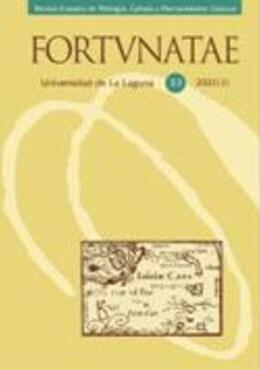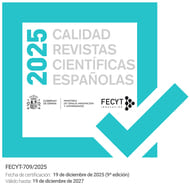Presencia autorial en la Electra de Sófocles
Resumen
La presencia del autor en la tragedia, donde el poeta nunca habla en primera persona y donde no hay una voz autorial que guíe nuestra recepción, es elusiva e implícita. A pesar de la polifonía de la tragedia, el propósito de este estudio es analizar algunos pasajes de Electra de Sófocles en busca de rastros textuales de la voz de su autor como respuesta a la Orestíada de Esquilo. Cada parte de este estudio se centra en diferentes aspectos de la poética autorreflexiva.
Citas
BARKER, Andrew (2004): «Transforming the Nightingale: Aspects of Athenian Musical Discourse in the Late Fifth Century», in Penelope MURRAY and Peter WILSON, Music and the Muses, Oxford, pp. 185-204.
BATCHELDER, Ann G. (1995):The Seal of Orestes. Self-Reference and Authorityin Sophocles’ Electra, Rowman & Littlefield Publ.
BILLING, Christian M. (2007): «Lament and Revenge in the Hekabe of Euripides», NewTheatre Quarterly 23.1: 49-57.
CARSON, Ann (2001): Sophocles Electra with Introduction and Notes by M. Shaw, Oxford Univ. Pr. CHONG-GOSSARD, James Harvey Kim On (2008): Gender and Communication in Euripides’ Plays: Between Song and Silence, Leiden.
CAMPBELL, Lewis (1881 [= Hildesheim 1969]): Sophocles. The Plays and Fragments edited with English notes and Introductions, vol. II, Oxford.
COLLARD, Christopher (2002): Aeschylus: Oresteia, Oxford.
CSAPO, Eric (2002): «Kallippides on the floor-sweepings: the Limits of Realism in Classical Acting and Performance Styles», in Patricia EASTERLING and Edith HALL, Greek and Roman Actors. Aspects of an Ancient Profession, Cambridge Univ. Pr., pp. 127-147.
DUNCAN, Anne (2005): «Gendered Interpretations: Two Fourth-Century B.C.E. Performances of Sophocles’ Electra», Helios 32.1: 55-79.
DUNCAN Anne (2006): Performance and Identity in the Classical World, N. York.
DUNN, Francis (1998): «Orestes and the Urn (Sophocles, Electra 54-55)», Mnemosyne 51: 438-443.
DUNN, Francis (2006): «Trope and setting in Sophocles’ Electra», in Irene J. F. DE JONG and Albert RIJKSBARON, Sophocles and the Greek Language: Aspects of Diction, Syntax and Pragmatics, Leiden, pp. 183-200.
FINGLASS, Patrick J. (2007): Sophocles Electra Edited with Introduction and Commentary, Cambridge Univ. Pr.
FOLEY, Helene P. (2001): Female Acts in Greek Tragedy, Princeton & Oxford.
FOUCAULT, Michel (1986): «Of Other Spaces», Diacritics 16.1: 22-27 (transl. from French to English by Jay MISKOWIEC).
FRAENKEL, Eduard (1950): Aeschylus Agamemnon: vol. II, Commentary 1-1055, Oxford.
FRAENKEL, Eduard (1962): Beobachtungen zu Aristophanes, Rome.
GASTI, Helen (2003): The Dialectic of Time in Sophocles’ Electra, Ioannina (in Greek with English summary).
GASTI, Helen (2007-2008): «Aeschylus’ Agamemnon 503-538: The poetics of space», Dodone 36-37: 189-194 (in Greek).
GASTI, Helen (2016): «Sophocles’ Electra 147-149: An authorial Comment», Mediterranean Chronicle 6: 21-36.
GOULD, John (1999): «Myth, Memory, and the Chorus: “Tragic Rationality”», in Richard BUXTON, From Myth to Reason? Studies in the Development of Greek Thought, Oxford, pp. 107-116.
HOPMAN, Marianne (2004): «Une déesse en pleurs: Niobé et la sémantique du mot theos chez Sophocle», REG 117.2: 447-467.
HUTCHINSON, Gregory O. (1999): «Sophocles and Time», in Jasper GRIFFIN, Sophocles Revisited. Essays Presented to Sir Hugh Lloyd-Jones, Oxford, pp. 47-72.
JEBB, Richard Claverhouse (1894 [= Amsterdam 1962]): Sophocles: The Plays and Fragments. Part VI: The Electra, Cambridge.
KAMERBEEK, Jan Coenraad (1974): The Plays of Sophocles. Part V: The Electra, Leiden.
KEELEY, Edmund and SHERRARD, Philip (1995): George Seferis: Collected Poems, Princeton Univ. Pr.
KELLS, J. H. (1973): Sophocles Electra, Cambridge.
KITZINGER, Rachel (1991): «Why mourning becomes Electra», ClAnt 10: 298-327.
KORNAROU, Eleni (2010): «The Mythological Exemplum of Niobe in Sophocles’ Antigone 823-833», RCCM 52.2: 263-278.
LLOYD-JONES, Hugh and WILSON, Nigel G. (eds.) (1990): Sophoclis Fabulae, Oxford.
LORAUX, Nicole (2002): The Mourning Voice: An Essay on Greek Tragedy, Cornell Univ. Pr.
MARCH, Jennifer R. (2001): Sophocles Electra edited with Introduction, Translation and Commentary, Aris & Phillips, Warminster.
MARSHALL, C. W. (2017): Aeschylus: Libation Bearers. Companions to Greek and Roman tragedy, LondonOxford.
MARTIN, Richard P. (2001): «Just Like a Woman. Enigmas of the Lyric Voice», in André LARDINOIS and Laura MCCLURE, Making Silence Speak. Women’s Voices in Greek Literature and Society, Princeton & Oxford, pp. 55-74.
MCCOSKEY, Denise Eileen (2009): «The Loss of Abandonment in Sophocles’ Electra», in Denise Eileen MCCOSKEY and Emily ZAKIN, Bound by The City. Greek Tragedy, Sexual Difference, and the Formation of the Polis, SUNY Pr., pp. 221-246.
MINADEO, Richard W. (1967): «Plot, Theme and Meaning in Sophocles’ Electra», C&M 28: 114-142.
MONELLA, Paolo (2006): «Il mito di Procne nel corpus tragico senecano: threnos, teatro, metateatro», in Filippo AMOROSO, Teatralità dei cori senecani, Palermo, pp. 133-148.
NOOTER, Sarah (2011): «Language, Lamentation, and Power in Sophocles’ Electra», CW 104: 399-417.
PAGE, Denys (ed.) (1972): Aeschyli septem quae supersunt tragoediae, Oxford.
REHM, Rush (2002): The Play of Space. Spatial Transformation in Greek Tragedy, Princeton and Oxford.
RINGER, Mark (1998): Electra and the Empty Urn. Metatheater and Role Playing in Sophocles, The Univ. of North Carolina Pr.
ROBINSON, Miranda Evelyn Marie (2014): Ways of Hearing in Sophocles: Auditory Spaces and social Dynamics in the Elektra, Philoktetes,Trachiniai, and OidipousTyrannos [Ph.D. Univ. ofToronto].
ROISMAN, Hanna M. (2008): Sophocles Electra. Translation with Notes, Introduction, Interpretive Essay and Afterlife, Focus Cl. Library-Newburyport, MA.
ROSELLI, David Kawalko (2011): Theater of the People: Spectators and Society in Ancient Athens, Austin.
SOLMSEN, Friedrich (1967): Electra and Orestes. Three Recognitions in Greek Tragedy, Amsterdam. SOMMERSTEIN, Alan (1994): Aeschylean Tragedy, Bari.
SWIFT, Laura A. (2010): The Hidden Chorus. Echoes of Genre in Tragic Lyric, Oxford Univ. Pr.
TAPLIN, Oliver (1977): The Stagecraft of Aeschylus: The Dramatic Use of Exits and Entrances in Greek Tragedy, Oxford.
THUMIGER, Chiara (2009): «On ancient and modern (meta)theatres: definitions and practices», MD 63: 9-58.
WOODARD, Thomas M. (1964): «Electra by Sophocles. The Dialectical Design», HSPh 70: 163-205.
WRIGHT, Matthew (2005): Euripides’ Escape Tragedies, Oxford.
Los autores conservan los derechos de autor y garantizan a la revista el derecho de ser la primera publicación del trabajo al igual que licenciarlo bajo una Creative Commons Attribution License que permite a otros compartir el trabajo con un reconocimiento de la autoría del trabajo y la publicación inicial en esta revista.
Los autores pueden establecer por separado acuerdos adicionales para la distribución no exclusiva de la versión de la obra publicada en la revista (por ejemplo, situarlo en un repositorio institucional o publicarlo en un libro), con un reconocimiento de su publicación inicial en esta revista.






